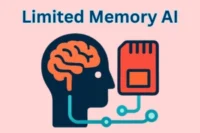Advantages & Disadvantages of Internet-importance, examples
Published: 10 Sep 2025
The Internet has changed the lives of more than 5 billion users around the world, influencing how we learn, work, act, and communicate. But have you ever wondered why it looks like both a blessing and a challenge? While the benefits are numerous, including information, global connection, and quick access to online shopping, it also presents shortcomings such as wasted time, scams, and health problems. Imagine life without the internet, no immediate answer, no social media, it is almost impossible to learn something digital.
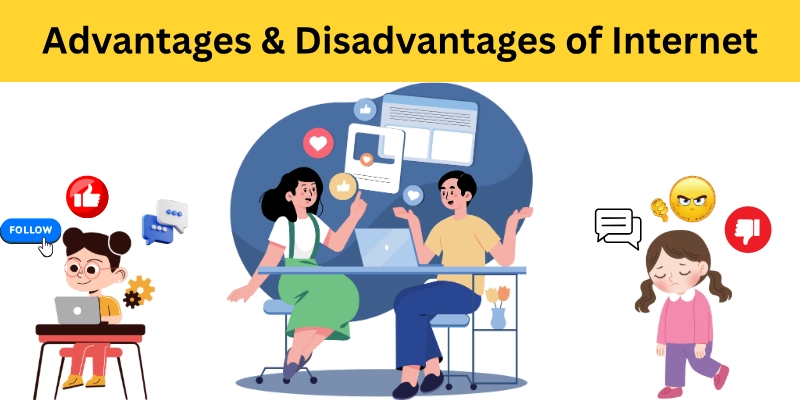
This is why it is important to understand the advantages & disadvantages of the Internet, so that we can clearly see both the profits and shortcomings, and use it carefully in daily life.
What is the Internet?
The internet is a global network that links millions of computers and devices together. It allows us to share information, talk with others, and access services anytime. Think of it like a huge library and marketplace where everything is available at your fingertips.
Without further delay, let’s get into the article and discuss the Advantages & Disadvantages of Internet.
Advantages of the Internet
The internet offers many benefits that make life easier and more connected.
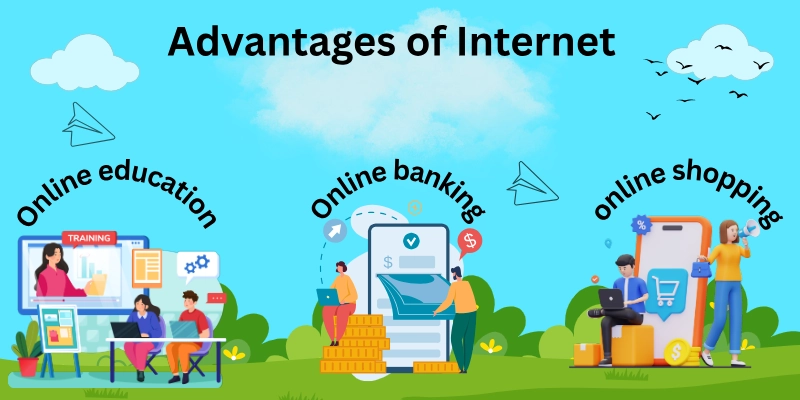
- Easy access to information
- Global communication
- Online education
- E-commerce and online shopping
- Entertainment
- Online banking and payments
- Remote work opportunities
- Social awareness
- Business growth
- Convenience and speed
Let’s explain these advantages of the internet one by one.
1. 🌐 Easy Access to Information
The internet is like the world’s biggest library. It keeps knowledge just a few clicks away. Whether you are a student, worker, or just curious, you can find answers in seconds. It makes learning simple and quick for everyone.
- You can search for anything instantly.
- Online libraries provide free books and papers.
- News sites update you every moment.
- Tutorials and guides help with daily tasks.
- Wikipedia explains topics in simple words.
- Students can find study material quickly.
- Health information is just one click away.
- Facts can be compared from many sources.
2. 💬 Global Communication
The internet connects people across the world like never before. Families, friends, and businesses can talk in real time. Messages, calls, and videos make distance feel smaller. It keeps relationships strong and helps people share ideas easily.
- Email lets you send instant messages.
- Video calls bring families together.
- Messaging apps allow free chatting.
- Social media helps share updates and photos.
- Businesses talk to clients worldwide.
- Language tools remove barriers.
- Online groups connect like-minded people.
- Forums let people share knowledge.
3. 🎓 Online Education
Education has grown beyond classrooms. The internet gives students the chance to learn anytime and anywhere. Teachers can share lessons online, and learners can explore subjects freely. It makes knowledge more open and available to all.
- Courses are available on e-learning sites.
- Lectures can be recorded and rewatched.
- Teachers use digital tools to explain.
- A study can happen anytime, anywhere.
- Free courses build new skills.
- Exams and quizzes happen online.
- Virtual classrooms support discussions.
- Certificates are given after courses.
4. 🛒 E-commerce and Online Shopping
Shopping online has become part of daily life. People can buy clothes, gadgets, food, and more from home. It saves time and gives access to a wide variety of products. Safe payments and fast delivery make shopping more enjoyable.
- Products are just one click away.
- Prices can be compared easily.
- Reviews guide the best choice.
- Online sales offer big discounts.
- Home delivery brings goods to your door.
- A huge variety is available online.
- Payments are fast and secure.
- Refunds and returns are simple.
5. 🎮 Entertainment
The internet is full of fun and relaxation. From movies to games, it offers something for everyone. People enjoy music, videos, and live streams every day. It keeps boredom away and makes free time exciting.
- Movies and shows stream anytime.
- Music apps give millions of songs.
- Online games connect players worldwide.
- YouTube has videos for all interests.
- Social media provides endless fun.
- Live streams connect fans with creators.
- Online books and comics are easy to read.
- Apps give fun quizzes and activities.
6. 💳 Online Banking and Payments
Managing money has never been this simple. Online banking makes transactions faster, safer, and more comfortable. You can send money, pay bills, and shop without visiting a bank. It saves time and gives you full control over your finances.
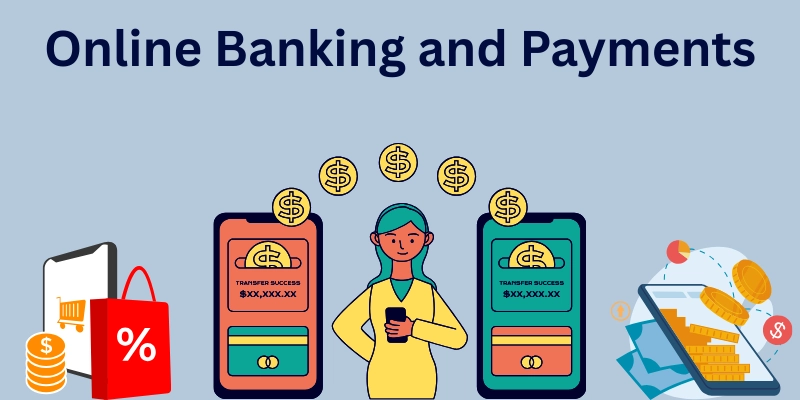
- Bills can be paid instantly.
- Money transfers are fast.
- Mobile wallets make payments simple.
- Online banking works 24/7.
- Apps keep transactions secure.
- Shopping sites accept digital payments.
- Mobile apps provide easy access.
- Transaction history is always available.
7. 💻 Remote Work Opportunities
Work is no longer tied to office spaces. Thanks to the internet, people can do jobs from anywhere. It opens doors to global opportunities and makes work more flexible. This helps balance career and personal life better.
- People can work from home or travel.
- Teams connect through online tools.
- Freelancers find jobs worldwide.
- Video meetings replace office meetings.
- File sharing makes teamwork easy.
- Work-life balance improves.
- Travel costs are reduced.
- Companies hire talent globally.
8. 📢 Social Awareness
The internet gives people a voice. It helps spread important messages and raise awareness on issues. Social platforms allow stories to reach millions quickly. This brings attention to problems and inspires positive change.
- News travels quickly on social media.
- Campaigns bring attention to issues.
- Stories inspire change in society.
- Petitions give everyone a voice.
- NGOs raise funds online.
- Awareness posts reach millions.
- Social media highlights problems.
- Communities support each other.
9. 📈 Business Growth
Businesses grow faster with the help of the internet. It allows them to connect with customers, promote products, and expand globally. Both small and large companies use online tools to compete and succeed.
- Ads reach large audiences online.
- Websites make businesses global.
- Social media builds brand awareness.
- Online shops increase sales.
- Digital tools track customers.
- Email marketing connects with buyers.
- Reviews build trust in products.
- Small businesses compete with big ones.
10. Convenience and Speed
The internet makes life quick and simple. From shopping to learning, almost everything is available online. It saves time and effort, giving people more comfort and flexibility.
- Services are open 24/7.
- Online booking is quick.
- Payments happen instantly.
- Messages reduce delays.
- Home delivery saves travel.
- Search engines give fast answers.
- Online forms replace paperwork.
- Apps provide all-in-one solutions.
Disadvantages of the Internet
The internet is very useful, but it also has many drawbacks. Spending too much time online can lead to health issues, less social contact, and addiction. It can also expose people to cybercrime, fake news, and privacy risks. Students and workers may get distracted, and many become overdependent on it for daily life.
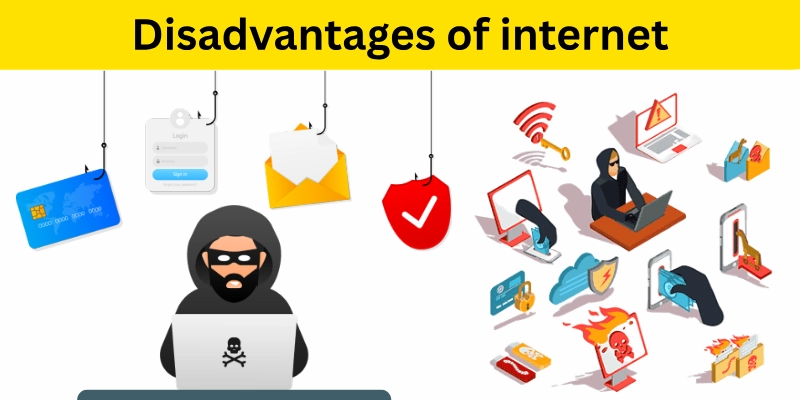
- Addiction
- Privacy issues
- Cybercrime
- Fake news
- Health problems
- Social isolation
- Online bullying
- Distraction(A Waste of Time)
- Security risks
- High dependence
Let’s explain these disadvantages of the internet one by one.
1. Addiction
The internet is highly addictive, especially for young people. Many spend hours scrolling social media, watching videos, or playing games. This habit wastes valuable time and keeps people from focusing on important tasks. Over time, addiction harms physical health, sleep, and real-life social life. It makes people restless when they are offline.
- Too much screen time wastes valuable hours.
- Students may ignore studies.
- Workers lose focus on tasks.
- Sleep problems happen from late-night use.
- Physical activities are reduced.
- People may feel restless without the internet.
- It affects mental health and concentration.
- Social life outside the internet gets weaker.
2. Privacy Issues
Privacy is one of the primary concerns associated with internet use. Websites, apps, and social media often collect user information without full consent. Hackers and scammers can misuse this data in harmful ways. Even sharing too much personal information online can put people at risk. Protecting privacy is becoming harder every day.
- Websites track user information.
- Apps ask for unnecessary access.
- Social media oversharing can be risky.
- Hackers steal personal details.
- Identity theft is possible.
- Emails and messages can be leaked.
- Ads use private data for targeting.
- Children’s safety is at risk.
3. Cybercrime
Along with useful tools, the internet also brings cybercrime. Criminals use it for scams, fraud, and illegal activities. Many people lose money or personal data because of online crimes. Cybercrime is growing quickly, and it affects both individuals and businesses. It makes the internet unsafe when proper care is not taken.
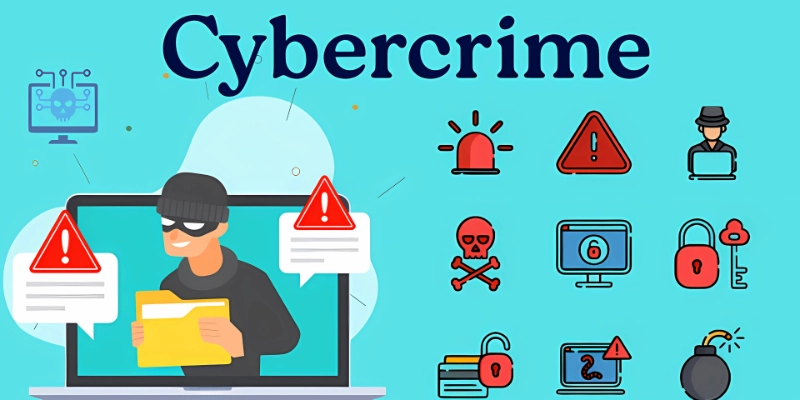
- Online scams cheat people out of money.
- Hackers break into accounts.
- Credit card fraud is common.
- Fake websites steal personal data.
- Viruses damage computers.
- Ransomware locks important files.
- Phishing emails trick users.
- Illegal trading happens on the dark web.
4. Fake News and Misinformation
Not everything online is true. Fake news spreads very fast and confuses people. Many believe false information because it looks real. This problem creates panic, divides society, and misguides students. Misinformation can even harm health when people follow wrong advice. It is one of the most dangerous disadvantages of the internet.
- Wrong facts confuse readers
- Social media spreads rumors quickly
- People panic due to false updates.
- Misleading health advice can be harmful.
- Political lies affect public opinion.
- Scams use fake stories to trick users.
- Fake images and videos go viral.
- Students may trust incorrect sources.
5. Health Problems
Using the internet for long hours affects both body and mind. Sitting in front of a screen reduces physical activity and weakens fitness. Eyes get strained, posture becomes poor, and sleep is disturbed. Mental health also suffers because of stress, anxiety, and social media pressure. These health issues are now common among regular internet users.
- Long screen time causes eye strain.
- Sitting too long leads to obesity.
- Poor posture causes back pain.
- Lack of sleep from late-night browsing.
- Anxiety from social media comparison.
- Stress from too much information.
- Addiction affects brain activity.
- Reduced outdoor activities harm fitness.
6. Social Isolation
The internet connects people online but disconnects them in real life. Many prefer chatting or gaming online instead of meeting friends or family. Over time, this reduces face-to-face interactions and weakens relationships. People may feel lonely even with thousands of online connections. Real social bonding gets replaced by virtual communication.
- Less face-to-face interaction
- Family time gets ignored.
- Friendships in real life weaken.
- People avoid outdoor activities.
- Online chats replace real talks.
- Isolation causes loneliness.
- Relationships suffer from less attention.
- Community bonding decreases.
7. Online Bullying (Cyberbullying)
Cyberbullying is a major problem on the internet. Many people, especially teenagers, face harassment on social media. Hurtful comments, threats, and fake accounts spread negativity. This bullying damages mental health and lowers confidence. In extreme cases, it can cause emotional breakdowns or even self-harm.
- Hurtful comments on social media.
- Students face bullying in online groups.
- Fake accounts spread hate.
- Threats and abuse damage mental health.
- Victims feel stressed and anxious.
- Cyberbullying can lower confidence.
- Private images or data get misused.
- Some cases lead to serious harm.
8. Distraction(A Waste of Time)
The internet is full of entertainment and information. While it can be useful, it also distracts people from important work. Students lose focus on their studies, and workers waste time online. Endless notifications, videos, and ads make it hard to stay disciplined. Distraction reduces productivity and delays important tasks.
- Students scroll during study hours.
- Workers lose time on social media.
- Games keep players hooked for hours.
- Ads pull attention away from tasks.
- Multitasking reduces productivity.
- Endless notifications disturb focus.
- Entertainment sites consume free time.
- Deadlines may get missed.
9. Security Risks
The internet is not always safe. Without strong protection, hackers can steal data or install viruses. Using weak passwords or unsafe Wi-Fi makes users vulnerable. Even banks and companies face risks of cyberattacks. Security threats make people feel unsafe while using the internet.
- Weak passwords are easy to break.
- Unsafe Wi-Fi exposes information.
- Viruses spread through downloads.
- Public computers may steal data.
- Emails with links may carry malware.
- Banking details can be stolen.
- Spyware tracks user activity.
- Ransom attacks block access to files.
10. High Dependence
People today depend heavily on the internet. From shopping to studying, almost everything is online. This high dependence makes life difficult when the internet is not available. Instead of learning basic skills, many rely only on digital help. It reduces independence and creates over-reliance on technology.
- Reliance on online maps for directions.
- Heavy use of online shopping.
- Dependence on digital payments.
- Students rely only on online notes.
- Social media replaces real connections.
- Businesses cannot function offline.
- Without the internet, work gets delayed.
- Life feels uncomfortable without it.
Let’s explain these disadvantages of the internet one by one.
Importance of Using the Internet Wisely
The internet is powerful, but how we use it makes all the difference. If used wisely, it can bring learning, growth, and success. But careless use can lead to risks, harm, and wasted time. That’s why balance is key.
- Always balance between benefits and risks.
- Follow safe browsing habits.
- Limit screen time to protect health.
- Install an antivirus for security.
- Use strong and unique passwords.
- Fact-check news before believing it.
- Avoid sharing too much personal info.
- Take regular breaks from screens.
Real-Life Examples
The internet impacts real life in both positive and negative ways. Looking at examples helps us understand their importance and risks.
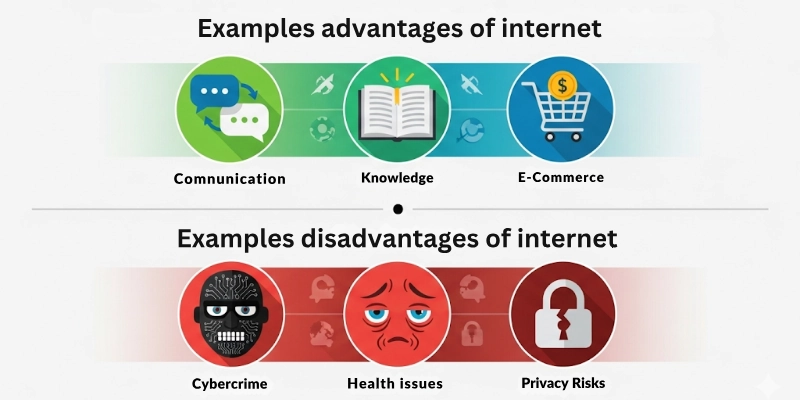
- Students attend online classes to continue their education.
- Businesses grow through e-commerce and reach more customers.
- Remote workers connect with teams worldwide.
- Doctors give online consultations to patients.
- Shoppers order food and products with one click.
- People face scams due to careless internet use.
- Social campaigns spread awareness about health and safety.
- Gamers build careers by streaming online.
Conclusion
Therefore, in this article, we have covered the Advantages & Disadvantages of the Internet in detail. From my part, I recommend using the Internet as a tool for learning, development, and connection, always in balance with real life. Be aware of general risks such as fake news, scams, addiction, and weak security, and protect your data with secure browsing habits. Remember that the Internet should be your help, not your master.
If you use it carefully, it can open the doors to education, career growth, and meaningful connections. Be safe, be smart, and continue searching the Internet to unlock endless opportunities for a bright future!
FAQs
Here are some common FAQs about the Advantages & Disadvantages of Internet.
The internet helps us learn, connect, and shop from anywhere in the world. It saves time and makes life easier. It also opens doors for business, work, and entertainment.
The internet can cause addiction, spread fake news, and harm health if overused. It also has risks like scams and privacy leaks. Using it without care may do more harm than good.
Students should use the internet for online classes, research, and learning new skills. They must avoid wasting time on unnecessary browsing. Setting a study plan helps balance learning and entertainment.
Both have pros and cons. Online classes offer flexibility, but traditional classes give face-to-face learning. A mix of both often works best for students.
Yes, the internet provides job listings, online courses, and networking platforms. It helps professionals connect globally. Skills learned online can open new opportunities.
Yes, if not monitored, children may see harmful content or spend too much time online. Parents should guide them and set limits. Child-safe apps and parental controls can help.
Always use strong passwords and never share personal details with strangers. Check websites for trust signals like HTTPS. Be careful of emails or messages that look suspicious.
Don’t believe or share it right away. Check the source and confirm with trusted websites. Fact-checking is the best way to avoid being misled.
Games, social media, and endless videos make people spend hours online. This habit creates dependence. Setting time limits and taking breaks can reduce addiction.
Experts suggest 2–3 hours of non-work screen time for adults and less for children. Too much time can hurt your eyes and health. Taking regular breaks keeps you safe and balanced.
The Internet of Things connects smart devices like home appliances, cars, and health trackers to make life easier and more efficient. Its advantages include convenience, time-saving, and automation. But disadvantages include privacy risks, high costs, and possible security threats if devices are not protected.

- Be Respectful
- Stay Relevant
- Stay Positive
- True Feedback
- Encourage Discussion
- Avoid Spamming
- No Fake News
- Don't Copy-Paste
- No Personal Attacks

- Be Respectful
- Stay Relevant
- Stay Positive
- True Feedback
- Encourage Discussion
- Avoid Spamming
- No Fake News
- Don't Copy-Paste
- No Personal Attacks



